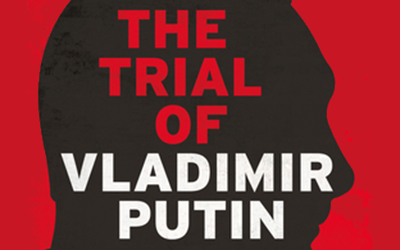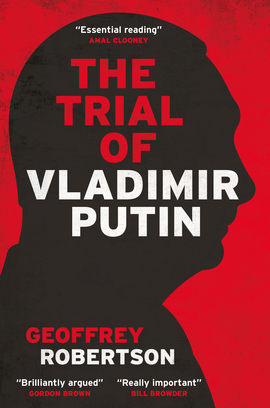
- Free Article: No
- Contents Category: Russia
- Review Article: Yes
- Article Title: The guilty ones
- Article Subtitle: How to try Vladimir Putin in absentia?
- Online Only: No
- Custom Highlight Text:
Vladimir Putin must be tried in an international court for ordering the 2022 Russian invasion of Ukraine. He must be tried, not just indicted, and to do this a new international court explicitly intended to deal with leaders responsible for such territorial aggression must be created. Since the Russian president won’t appear before any international court, he will need to be tried in absentia. Nevertheless, such a trial is essential not only to uphold international law, but to deter other international leaders who are contemplating aggression.
- Featured Image (400px * 250px):

- Alt Tag (Featured Image): Nick Hordern review ‘The Trial of Vladimir Putin’ by Geoffrey Robertson
- Book 1 Title: The Trial of Vladimir Putin
- Book 1 Biblio: Biteback Publishing, $34.99 pb, 218 pp
- Book 1 Cover Small (400 x 600):

- Book 1 Cover (800 x 1200):

The International Criminal Court (ICC) has already issued a warrant for Putin’s arrest on the irrefutable charge of ordering the transportation of children from Ukrainian territory – irrefutable because he actually boasted on television of having done so. Because it doesn’t conduct trials in absentia, the ICC, to try Putin, would need him brought before it in The Hague. This is unlikely to happen, hence the need for Robertson’s proposed court.
In recent decades, several ad hoc international tribunals have paved the way for such a court, including the International Criminal Tribunals for former Yugoslavia and for Rwanda. But these were established by resolutions of the UNSC, and the certainty of a Russian veto there means that no such resolution to establish a court to try Putin – as well as his ministers, generals, and cheerleaders such as Patriarch Kirill of the Russian Orthodox Church – would be forthcoming. As a model, Robertson prefers the Special Court for Sierra Leone which was set up by a different method, a bilateral agreement between the UN Secretary General (UNSG) and the government of Sierra Leone. Such an arrangement would endow the court with UN authority while making it independent of the UNSC. In this case, the tribunal would be established by an agreement between the UNSG and the government of Ukraine; it would be best seated in The Hague and it would be explicitly empowered to conduct trials in absentia.
Although much to be desired, the punishment of Putin would not be the main goal of the trial. This would be to demolish for all time his ‘justification’ for aggression: that he was compelled to invade Ukraine for historical and strategic reasons. In order to thus set the record irrevocably straight, the court must go to exhaustive lengths to establish its impartial credibility. It must be separate from the Ukrainian legal system – unlike the quasi-international tribunal established to try the Khmer Rouge leadership, which was fatally embedded in a ‘dysfunctional’ Cambodian legal system. The judges could be drawn from countries like Trinidad, South Africa, and Brazil, rather than from Ukraine and NATO members. The absent Putin must be vigorously defended by lawyers of the highest calibre and reputation. The absence of such lawyers, Robertson believes, compromised the trial in absentia of those accused of shooting down Malaysian Airlines flight MH17.
Robertson recounts the deplorable history of the P5’s opposition to the expansion of an international jurisdiction – not just from the Russians. George W. Bush was implacably hostile to the exercise of international law, and Donald Trump actually placed a ban on ICC personnel entering the United States (President Joe Biden reversed it). This is an unedifying tale, but to get a sense of just how far the world has travelled since World War II, it is worth revisiting Orwell’s 1943 essay ‘Who Are the War Criminals?’. Orwell was a sceptic, and he mocked the idea of putting Benito Mussolini on trial on the grounds that, in the (then) absence of international law, it would be hard to accuse the Italian dictator – despite his appalling record of crimes against humanity and genocide (a term that hadn’t yet been coined) – of anything concrete.
The filling of that void, the development of international law and an international jurisdiction, is precisely the achievement chronicled by The Trial of Vladimir Putin – and so, on that point Orwell’s criticism has been answered. But Orwell also argued that any such trial must inevitably be tainted by hypocrisy because geopolitics are a ‘moral pigsty’: some hands are dirtier than others, but none are clean. This point still holds good, and for all Robertson’s championing of scrupulously impartial international courts, the cynic wonders why it always seems to be African warlords and Slavic despots who wind up in front of them. Are they really the only guilty ones?
Things might be changing. On 21 May, the ICC’s chief prosecutor, Karim Khan, announced that he was seeking arrest warrants for Israeli Prime Minister Benjamin Netanyahu, as well as three senior Hamas figures, for crimes against humanity. The application for warrants must be approved by a panel of ICC judges, which could take months. Netanyahu, Biden, and Hamas all immediately condemned the ICC announcement as implying moral equivalence between the participants in the Gaza war.
Robertson’s book barely mentions Israel – merely to note that it opposed the creation of the ICC. But in light of his analysis, a decision by the Court to issue warrants for Netanyahu and the Hamas leaders would be highly significant – and a decision not to, equally so. The Trial of Vladimir Putin will be essential background reading as the world awaits the ICC’s decision.


Comments powered by CComment